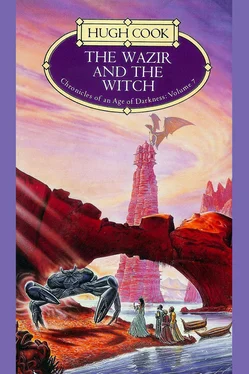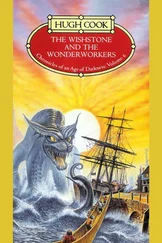Hugh Cook - The Wazir and the Witch
Здесь есть возможность читать онлайн «Hugh Cook - The Wazir and the Witch» весь текст электронной книги совершенно бесплатно (целиком полную версию без сокращений). В некоторых случаях можно слушать аудио, скачать через торрент в формате fb2 и присутствует краткое содержание. Жанр: Фэнтези, на английском языке. Описание произведения, (предисловие) а так же отзывы посетителей доступны на портале библиотеки ЛибКат.
- Название:The Wazir and the Witch
- Автор:
- Жанр:
- Год:неизвестен
- ISBN:нет данных
- Рейтинг книги:5 / 5. Голосов: 1
-
Избранное:Добавить в избранное
- Отзывы:
-
Ваша оценка:
- 100
- 1
- 2
- 3
- 4
- 5
The Wazir and the Witch: краткое содержание, описание и аннотация
Предлагаем к чтению аннотацию, описание, краткое содержание или предисловие (зависит от того, что написал сам автор книги «The Wazir and the Witch»). Если вы не нашли необходимую информацию о книге — напишите в комментариях, мы постараемся отыскать её.
The Wazir and the Witch — читать онлайн бесплатно полную книгу (весь текст) целиком
Ниже представлен текст книги, разбитый по страницам. Система сохранения места последней прочитанной страницы, позволяет с удобством читать онлайн бесплатно книгу «The Wazir and the Witch», без необходимости каждый раз заново искать на чём Вы остановились. Поставьте закладку, и сможете в любой момент перейти на страницу, на которой закончили чтение.
Интервал:
Закладка:
‘If it exists,’ said the Crab.
‘But of course it exists!’ said Olivia. ‘You mustn’t be like that. Look, why don’t you really make yourself wazir? It would be much safer for us. We could… we could look for this rectifier thing ever so much harder.’
‘Leave the poor Crab alone,’ said Chegory. ‘It doesn’t want to be troubled about organic rectifiers and things, not today.’
Olivia had the better brain, but Chegory possessed a greater degree of empathy with the Monster of Jod, and understood more of its bitter, stoical outlook. From past conversations, Chegory knew the Crab had been lied to by many humans in the past. Many promises had been made to it — promises which had subsequently been broken. Wizards and sorcerers alike had promised to turn it into man, child or woman; but all had failed. The Crab had been disappointed so many times it did not feel it could afford to trust any such promises ever again.
This Chegory knew; and Olivia could have benefited from his knowledge. But, unfortunately, the Ashdan lass took exception to the Ebrell Islander’s tone of voice, and this led to a quarrel. Which left them both upset, and Olivia in tears. Though they soon got over it, and had quite repaired their relations by nightfall.
That night, Pelagius Zozimus, Ivan Pokrov and Artemis Ingalwa organized a special dinner to celebrate the escape of Dui Tin Char and the rapid spread of authenticating rumours which had followed that escape. Now all Injiltaprajura believed that the Crab ruled as wazir. On Tin Char’s authority, no less.
The mature adults were immensely relieved, for the last few days had been tense indeed.
But Chegory Guy and Olivia Qasaba felt no relief because they had felt no worry. While Untunchilamon lurched from one crisis to another, while panicked depositors mobbed the Narapatorpabarta Bank and agents of the Inland Revenue resorted to heavyweight tranquillizers, while spies and thieves fought to the death for possession of scraps of the mysterious Injiltaprajuradariski, while Juliet Idaho and Nadalastabstala Ban-raithanchumun Ek fumed with impatience (Idaho metaphorically and the chain-smoking Ek literally), Chegory and Olivia passed their days in what was almost another world entirely.
Such are the ways of youth that the crisis in which Chegory and Olivia were so intimately involved was but a remote background to the true drama of their lives.
For they were in love.
This may lead some readers to throw up their arms and cry out in despair; but the historian records it with tolerant understanding. For, in a long and often bitter life, the historian has learnt that there are forms of folly which are far, far worse than the systematic delusions which accompany amation.
One such folly, one of millions, is to But I have come to the end of another sheet of fooskin; therefore I will call a halt to this chapter here, and launch into a disquisition upon certain forms of political folly (notably philosophical objection to the paying of taxes) at the start of the next.
CHAPTER NINETEEN
Nadalastabstala Banraithanchumun Ek knew full well (as knows your historian) that taxes must be paid. Or else the State will wither away. The withering of the State would give great satisfaction to certain feckless political philosophers; but such a prospect is less than attractive to those who rely for their livelihood upon the roads and irrigation systems organized and protected by the State.
One of the biggest problems associated with the withering of the State is the rise in thuggery which typically accompanies such withering. Solo muggers become organized bandits, among whom warlords in time come to power, eventually throwing up a master of murder who makes himself emperor and sets in place his own version of the State.
The bottom line is this: those who wish to sleep safely in their beds had better be prepared to pay their taxes.
Master Ek knew this full well.
Nevertheless, while Ek was a financial realist, it would have been hard to gather this from the fiery speeches he made over the next few days. He preached to packed congregations, for a great many people had suddenly discovered a new or renewed faith in Zoz the Ancestral now that such loyalty could win them tax advantages equal to those offered by the Cult of the Holy Cockroach.
What possessed Master Ek to pursue this folly?
Was senility at last setting in?
Justina sent her spies to audit Master Ek’s sermons, and the spies came back with the most alarming news. While Ek’s preaching did not deviate from the orthodox doctrines of his religion, it nevertheless carried the most alarming political overtones, and was being received with adulatory acclamation.
Not to put too fine a point on it, Master Ek was stirring up a lynch mob.
The High Priest of Zoz the Ancestral was too afraid of the Crab to oppose it directly. Believing Justina to be under the Crab’s protection, Ek durst not order people to chop off her head. Dui Tin Char’s panic-stricken flight into the deserts of Zolabrik had convinced Ek of the wisdom of his long-pursued policies of caution; and, as many hot heads had been cooled by the Crab’s explicit intervention into the politics of Injiltaprajura, it was unlikely that Ek would have been obeyed had he ordered Justina’s death.
However, a mob in its madness will do what no individual in its ranks would dare alone. Ek knew this. Justina knew this. And Ek knew (and Justina knew that he knew) that any overt move against the Temple of Zoz by Empress or Crab would not forestall a riot but instead would precipitate it immediately; for the Temple’s fall would mean financial ruin for a great many citizens of Injiltaprajura had already committed themselves to new mortgages and hire purchase agreements on the strength of the tax breaks so recently granted them by that Temple.
Ek was in his element.
When Nadalastabstala Banraithanchumun Ek preached in the Temple, a great weight of age seemed to slip from his shoulders; he seemed to gain height in fingerlengths and to grow broader across the shoulders. The pains of his arthritis eased, ebbed, then vanished entirely. His voice, slightly hoarse thanks to his incessant cigarette smoking, crooned and inveigled as he insinuated himself into the confidence of his congregation.
‘Power,’ he said. ‘We worship Zoz because Zoz is power. Power is the greatest good. The weak were made to kneel before power, because such is the nature of reality.’
With such self-evident truths old Master Ek began.
Then, when he had his people in his power, when his voice had replaced the function of thought, he worked on them with rhythms designed to lead to a destruction of the self in a climax close to orgasm.
Sometimes he innovated his own speeches.
Sometimes a mere recital of Holy Writ sufficed.
Hear him.
Hear Master Ek.
Listen!
‘In the Beginning was the mire of the morass, the slime of the pulp.
‘In the Beginning was the darkness, and floods of filth moved back and forth within the darkness, void of face and without form.
‘And the floods were lustful and without continence.
‘And the name of the Beginning was Woman.
‘And she in her depths was dark and knew not of herself, and a great Abyss was she, with snakes within her substance.
‘This was the time of the lowest, for she was low, no height had she.
‘Nor did she yearn for height.
‘For her nature was to drag down and swallow, to swallow and submerge, to submerge and dissolve, to dissolve and ruin, and this to and with herself she did.
‘And the face and the skin of the Woman were clutching waters, and a great rain fell perpetually upon those waters.
‘Yet the waters were not cleansed thereby.
‘And the rain merged with the waters and became unclean.
Читать дальшеИнтервал:
Закладка:
Похожие книги на «The Wazir and the Witch»
Представляем Вашему вниманию похожие книги на «The Wazir and the Witch» списком для выбора. Мы отобрали схожую по названию и смыслу литературу в надежде предоставить читателям больше вариантов отыскать новые, интересные, ещё непрочитанные произведения.
Обсуждение, отзывы о книге «The Wazir and the Witch» и просто собственные мнения читателей. Оставьте ваши комментарии, напишите, что Вы думаете о произведении, его смысле или главных героях. Укажите что конкретно понравилось, а что нет, и почему Вы так считаете.












